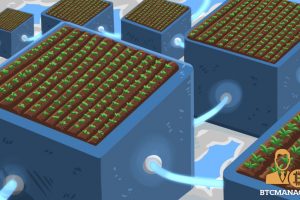Cerealia is Revolutionizing Agriculture Through Tokens for Grain Deals

Blockchain in agriculture is evolving. In the Swiss crop trading blockchain company, Cerealia, technology has been piloted that makes it possible to trade grain using virtual tokens.
Blockchain Easing Deals in Agriculture
According to Filipe Pohlmann Gonzaga, the Chief Operating Officer of Pully, Switzerland, Cerealia SA has developed a non-fungible token supported by 30,000 metric tons of Mexican White Corn. Mercanta provided the token for grain, both operated by Grupo Ceres, in the Triple T terminal in Mexico.
Cerealia’s platform has only sponsored bilateral dealings between physical grain traders and has attracted interest and offers some six million tons of Grain since its launch in November. “The next move is to set up a framework which will allow financial institutions and speculators to participate without physical grain delivery,” he said.
Token dealings will lead to eliminating the burdens and costs of a variety of grain transactions. Trade houses and others will issue tokens to supply them, which will then be exchanged without physical documents that enable most commodity transactions on the Cerealia blockchain platform.
Pohlmann said in a phone call that clients could easily exchange the token. “For other players, including hedge funds and financial companies, trading opens up,” he says.
Cerealia claims to be the first specialist international online agri-trading market to provide contractual assurance. Verbal deals are commonplace in today’s commodity markets without proof of time, firm, or quotation. Disputes also occur, and transactions are not successful. It reduces the competition, as major players tend to work with only established and trusted partners.
The issue is complicated in the emerging countries because their demand for commodities is unorganized, and structured training sites such as the developing world are not available. Traders also have to trade in the US dollar in these nations. In addition to paying exorbitant trade finances, they also lose money because of FX fluctuations.
Cerealia began grain trade in the Black Sea region but spread to markets like Brazil and Egypt. The business will soon have a Singapore representative and will be heading towards sub-Saharan Africa, which is also present in Ukraine. It has clients in nearly 30 countries. Andrei Grigorov, Chief Executive Officer, said Mexico’s most recent deal was to expand its scope.
The Future of Blockchain in the Agriculture Industry
Blockchain is a technology that is developing. While a lot of sectors have started to revolutionize, a lot remains to be done.
More accountability in supply chains is provided through blockchain technology as customers become more involved in their food source. Crop giants, including Bunge Ltd., Cargill Inc., and Viterra, joined forces in introducing their own Covantis SA ledger system.
However, the opportunity for blockchain technology in the agriculture industry is becoming increasingly evident. The global agricultural industry currently stands at more than $2.4 trillion and includes more than a billion people worldwide. There is now a possibility for creativity more than ever.
Related posts:
Source: Read Full Article
